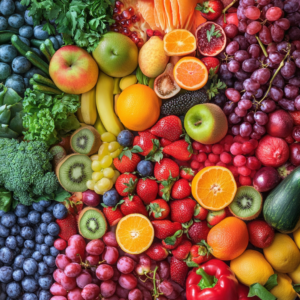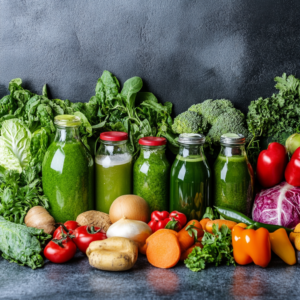Introduction
Hello, fellow health enthusiasts! I’m thrilled to present a comprehensive guide on understanding vegan nutrition: what every beginner should know. In this article, you will discover valuable insights into the fundamentals of a well-planned vegan diet, learn about essential nutrients, and gain practical tips for transitioning to and maintaining a balanced plant-based lifestyle. By grasping the core principles of vegan nutrition, you can optimize your health, boost your energy levels, and lay a solid foundation for long-term wellbeing. This guide is dedicated to helping you develop a deeper understanding of vegan nutrition and how it can empower your health journey. For more detailed tips on plant-based nutrition, feel free to explore 10 Essential Vegan Nutrition Tips for a Healthier Life.
Understanding Vegan Nutrition: What Every Beginner Should Know
This section introduces the key concepts that set the stage for a deep dive into the nutritional components of a vegan diet and establishes the importance of understanding vegan nutrition for overall health.

1. Why Vegan Nutrition is Important
Embracing vegan nutrition is not just a dietary choice—it’s a lifestyle that supports overall health, sustainability, and ethical living. A well-planned vegan diet can reduce the risk of chronic diseases, improve energy levels, and enhance your quality of life. When you truly understand vegan nutrition, you learn how to balance macronutrients and micronutrients to ensure your body receives all it needs for optimal functioning.
a. The Role of Vegan Nutrition in Overall Health
Vegan nutrition plays a crucial role in maintaining a healthy body by providing an abundance of vitamins, minerals, antioxidants, and fiber. By focusing on whole, plant-based foods, you naturally reduce your intake of processed ingredients and unhealthy fats, leading to improved heart health, better digestion, and even weight management. A diet rich in fruits, vegetables, legumes, and whole grains helps protect against various diseases, supporting a strong immune system and overall vitality. Understanding vegan nutrition means recognizing that each nutrient plays a role in your body’s complex systems—from cellular repair to immune defense.
b. Enhanced Energy and Wellbeing Through Vegan Nutrition
Many beginners report that switching to a vegan diet increases their energy and mental clarity. A nutrient-dense vegan diet ensures a steady supply of energy by providing complex carbohydrates, healthy fats, and lean plant proteins. Over time, this balanced approach can result in improved mood, reduced inflammation, and enhanced overall wellbeing. When you focus on understanding vegan nutrition, you learn that the right foods can fuel not just your body but also your mind—helping you to stay focused, manage stress, and enjoy a more positive outlook on life. In essence, understanding vegan nutrition is key to unlocking the potential for a healthier, more energetic lifestyle.
2. Essential Nutrients in a Vegan Diet
A common concern for those new to veganism is whether a plant-based diet can supply all the necessary nutrients. However, with careful planning and variety, a vegan diet can provide everything your body requires. Below, we explore the essential nutrients and how understanding vegan nutrition can help you source them effectively.
a. Protein and Amino Acids
Protein is fundamental for building and repairing tissues. While animal proteins are complete, plant proteins can be combined to form a complete amino acid profile. Sources such as legumes, nuts, seeds, and whole grains each contribute different amino acids. For example, combining rice and beans creates a balanced protein source that meets your body’s needs. Understanding vegan nutrition involves recognizing the importance of variety in protein sources to ensure you receive all essential amino acids.
b. Iron and Its Absorption
Iron is critical for oxygen transport in the blood and overall energy. Plant-based iron, known as non-heme iron, is not absorbed as efficiently as heme iron from animal products. However, by consuming iron-rich foods like lentils, chickpeas, spinach, and fortified cereals along with vitamin C–rich foods (such as oranges or bell peppers), you can significantly enhance iron absorption. Understanding vegan nutrition means being aware of these combinations to prevent iron deficiency and maintain optimal energy levels.
c. Calcium for Strong Bones
Calcium is essential for bone health, muscle function, and nerve signaling. Vegans can obtain calcium from fortified plant milks, calcium-set tofu, leafy greens (such as kale and bok choy), and almonds. By ensuring a consistent intake of calcium-rich foods, you help maintain strong, healthy bones. A deep understanding of vegan nutrition includes knowing which foods to pair for maximum absorption and the importance of regular calcium consumption in preventing bone-related issues.
d. Vitamin B12 and Vitamin D
Vitamin B12 is crucial for nerve function and blood formation, but it is primarily found in animal products. Therefore, vegans must rely on fortified foods or supplements to meet their needs. Similarly, vitamin D is vital for bone health and immune function. Although sunlight can provide vitamin D, many people choose fortified foods or supplements, especially during winter months or in regions with limited sun exposure. Understanding vegan nutrition means acknowledging the need for these nutrients and planning accordingly to avoid deficiencies.
e. Omega-3 Fatty Acids and Healthy Fats
Omega-3 fatty acids are known for their anti-inflammatory properties and support for heart and brain health. These essential fats can be found in flaxseeds, chia seeds, hemp seeds, and walnuts. Including these sources in your diet helps maintain a healthy balance of essential fatty acids. Understanding vegan nutrition also involves recognizing the role of healthy fats in overall health and ensuring they are incorporated into your meals.
f. Fiber, Antioxidants, and Micronutrients
A vegan diet is naturally high in fiber, which aids in digestion and helps regulate blood sugar levels. Additionally, the abundance of antioxidants from fruits, vegetables, and legumes plays a protective role against cellular damage and chronic diseases. Micronutrients such as magnesium, potassium, and zinc are plentiful in a varied plant-based diet, contributing to overall metabolic health. Gaining a thorough understanding of vegan nutrition empowers you to harness these benefits fully.

3. Planning a Balanced Vegan Diet for Understanding Vegan Nutrition
Understanding vegan nutrition also involves practical meal planning. A well-structured plan ensures that you meet your nutritional requirements while enjoying a variety of flavors and textures in your meals.
a. Meal Planning Tips for Beginners
For those new to veganism, planning your meals in advance can make the transition smoother. Start by listing your favorite vegan foods and recipes, and create a weekly menu that includes a diverse range of protein sources, iron-rich vegetables, and healthy fats. This not only ensures nutritional balance but also adds variety and excitement to your meals. A clear meal plan helps you stay organized, reduce food waste, and manage your grocery budget more effectively—all crucial components of understanding vegan nutrition.
b. Combining Foods for Complete Nutrition
One effective strategy in vegan nutrition is pairing complementary foods. For example, combining whole grains with legumes creates a complete protein source, while pairing vitamin C–rich fruits with iron-rich vegetables enhances iron absorption. Thoughtful food combinations not only maximize nutrient uptake but also make your meals more enjoyable and varied. By understanding vegan nutrition, you can experiment with these pairings and discover delicious recipes that meet all your dietary needs.

4. Debunking Common Myths About Vegan Nutrition
There are many misconceptions about vegan nutrition that can discourage beginners. Some believe that a vegan diet lacks sufficient protein or that it leads to nutritional deficiencies. However, with proper planning and a varied diet, vegans can easily meet or exceed their nutritional requirements.
- Myth 1: “Vegans can’t get enough protein.”
Fact: A diverse range of plant-based proteins, when consumed in combination, provides all essential amino acids. - Myth 2: “A vegan diet leads to nutritional deficiencies.”
Fact: With careful meal planning and, if necessary, supplementation for nutrients like vitamin B12, a vegan diet can be nutritionally complete.
Understanding these myths is an important part of understanding vegan nutrition and building confidence in your dietary choices.
5. Practical Tips for Transitioning to a Vegan Diet: Enhancing Your Understanding of Vegan Nutrition
Transitioning to a vegan diet can be a rewarding journey when you are equipped with the right knowledge and strategies. Here are some practical tips for beginners that will help deepen your understanding of vegan nutrition while making the change smoother.
a. Building Your Vegan Pantry
Stock your kitchen with a variety of whole foods such as grains, legumes, fruits, vegetables, nuts, and seeds. Having these staples on hand makes it easier to create nutritious meals without the need for frequent store trips. A well-stocked pantry is essential for understanding vegan nutrition and ensuring that you always have the ingredients necessary to prepare balanced meals.
b. Smart Shopping and Cooking Strategies
Plan your meals ahead of time to avoid impulsive choices that stray from vegan options. Consider shopping at local farmers’ markets for fresh, organic produce and buying in bulk to save money. Experiment with simple recipes and gradually incorporate new ingredients to diversify your palate. By developing these habits, you not only simplify your daily meal preparation but also reinforce your understanding of vegan nutrition and its benefits.For those looking to enhance their nutritional journey with vegan recipes, consider exploring our recommended selections.
6. Internal and External Resources for Further Learning About Understanding Vegan Nutrition
Continuous learning is key to mastering vegan nutrition. The following resources provide valuable insights, practical advice, and scientific backing to help you further your understanding of a balanced vegan diet.
Further Reading and Research
Internal Resources:
• Explore 10 Essential Vegan Nutrition Tips for a Healthier Life for foundational guidance on vegan nutrition.
• Discover a variety of practical recipes at Quick and Delicious Vegan Recipes for Busy Weeknights.
• Learn how to prepare cost-effective yet delicious meals with Budget-Friendly Vegan Meals That Don’t Sacrifice Taste.
External Resources:
Reputable websites such as Nutrition.gov provide official dietary guidelines, while PubMed offers access to peer-reviewed studies on vegan nutrition. Additionally, a highly regarded YouTube video from a trusted channel offers practical advice and creative inspiration for maintaining a healthy vegan diet. These resources can significantly enhance your understanding of vegan nutrition and help you make informed dietary choices.
7. Frequently Asked Questions (FAQ)
Common Queries Answered
Q1: Can a vegan diet provide enough protein?
A1: Yes, by consuming a variety of protein-rich plant foods such as legumes, nuts, seeds, and whole grains, you can meet your protein needs and obtain all essential amino acids.
Q2: How do vegans get enough iron?
A2: Vegans can obtain iron from sources like lentils, chickpeas, spinach, and fortified cereals. Pairing these foods with vitamin C–rich fruits enhances iron absorption.
Q3: What about vitamin B12?
A3: Since vitamin B12 is primarily found in animal products, vegans should rely on fortified foods or supplements to meet their needs.
Q4: How can I ensure a balanced intake of essential nutrients?
A4: Plan your meals to include a variety of fruits, vegetables, whole grains, legumes, nuts, and seeds. Combining complementary foods, such as grains with legumes, ensures you get a complete range of nutrients.
Q5: Are there any common mistakes beginners make with vegan nutrition?
A5: One common mistake is not diversifying food sources enough, which can lead to nutrient gaps. It is important to incorporate a wide range of plant-based foods and consider supplements for nutrients like vitamin B12 and vitamin D.
Q6: How can I transition smoothly to a vegan diet?
A6: Gradually replace animal products with plant-based alternatives, experiment with new recipes, and educate yourself about nutritional needs. Utilizing meal planning and preparation strategies can also ease the transition and deepen your understanding of vegan nutrition.
8. Conclusion and Final Thoughts on Understanding Vegan Nutrition
In conclusion, understanding vegan nutrition is fundamental for anyone embarking on a plant-based lifestyle. By familiarizing yourself with the essential nutrients, debunking common myths, and applying practical meal planning strategies, you can build a balanced vegan diet that supports optimal health and wellbeing. Embracing vegan nutrition not only benefits your body but also contributes to environmental sustainability and ethical living. With the right knowledge and preparation, you can enjoy a vibrant, energetic, and fulfilling vegan lifestyle.
I hope this comprehensive guide has provided you with the insights and confidence to explore vegan nutrition further. Remember, every small step—whether it’s diversifying your meals or carefully planning your nutrition—contributes to long-term health and a more sustainable way of living. Enjoy the journey toward a healthier, more balanced lifestyle, and continue to learn as you progress.
Thank you for taking the time to read this guide. Stay curious, stay healthy, and embrace the many benefits of a well-planned vegan diet.